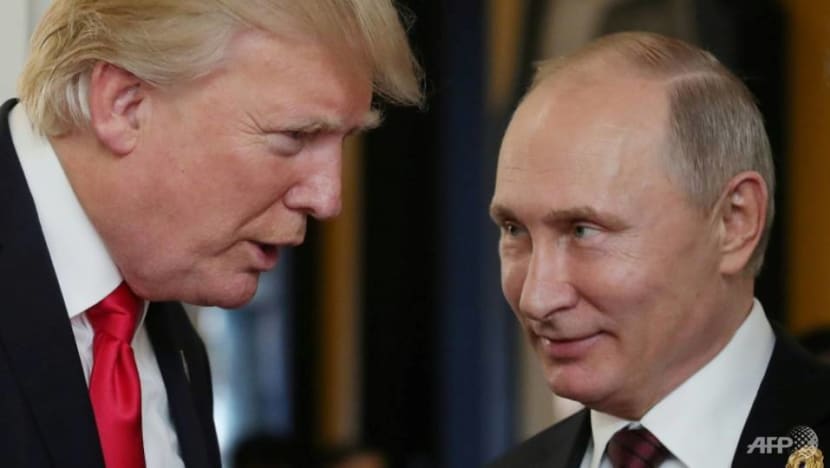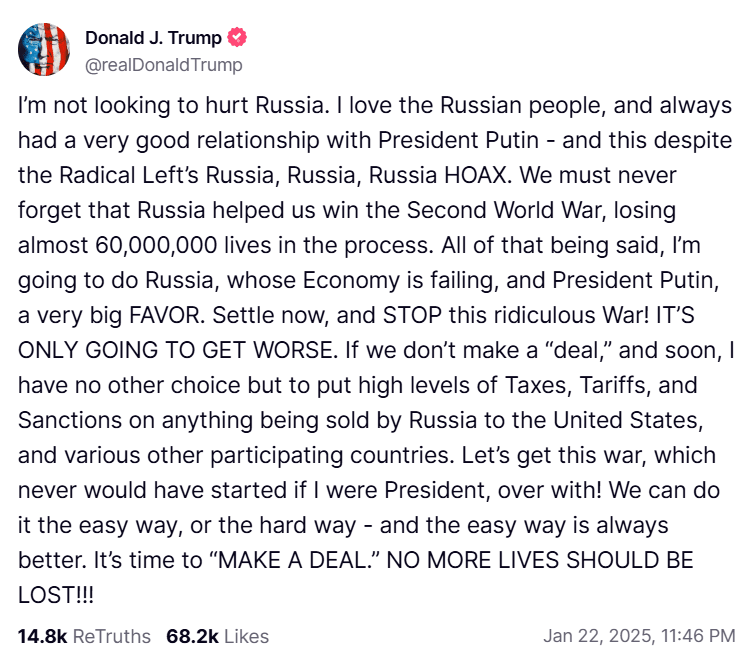Commentary: Trump’s ‘ridiculous war must end now’ warning to Putin is a surprise
Newly inaugurated US President Donald Trump seems to grasp, at last, that he can push not just Ukraine, but also Russia, to end the war, says professor of political science Robert Kelly.


This audio is generated by an AI tool.
BUSAN: In a surprise turn, freshly inaugurated US President Donald Trump on Wednesday (Jan 22) threatened Russian President Vladimir Putin with sanctions and tariffs if he does not wind down the war in Ukraine. This was unanticipated.
In 2022, he called Putin “genius” and “savvy” for his move on Ukraine. On Wednesday, he threatened sweeping tariffs on Russia if Putin did not end the “ridiculous war”, saying: “We can do it the easy way, or the hard way”.
Trump has been conspicuously friendly toward Putin for years, and Trump’s MAGA (Make America Great Again) political movement has been explicitly pro-Russian regarding the war. Trump’s Vice President, JD Vance, has openly said he does not care who wins, and Trump is widely expected to halt US arms shipments to Ukraine.
The conventional wisdom for years has been that Trump, if re-elected, would deprive Ukraine of aid in order to force it to negotiate. In those negotiations, Ukraine would be at a distinct disadvantage. It would likely have to cede its claim to Crimea - taken by Russia in 2014 - and accept indefinite Russian control of its further conquests since 2022.
Trump, the logic went, would agree because he does not care much for US alliances and partnerships, and because of his curious relationship with Putin. All this is now uncertain.

HAS TRUMP CHANGED HIS MIND ON RUSSIA?
Trump has always been mercurial and enjoyed surprising observers. This week’s U-turn fits that pattern. It’s possible Trump’s staff have convinced him that Russia is weaker than it appears, will not resort to nuclear weapons to win, and is economically vulnerable to threats of semi-permanent isolation and sanction.
All of this is correct. Russia is large enough compared to Ukraine that it can likely win a limited victory - carving off about 20 per cent of Ukrainian territory in the east - through sheer mass. And it is also true that Ukraine cannot militarily re-take much of what it has lost. But the cost to Putin and Russia of this limited victory has been enormous and will worsen if Russia cannot normalise its relationship with the rest of the world.
It is this vulnerability that Trump now seems to sense. Russia’s economy is on war footing, which generates the crushing mass necessary to make gains on the ground in Ukraine, but which comes with obvious costs. Civilian investment is starved as production is diverted to military needs. Financing for research, education, infrastructure, repair, and so on is cut. The population must endure shortages as civilian production dries up. Elevated military spending over the medium term generates economic stagnation.
Sanctions only make these pressures worse. Foreign inputs and technologies are lost. Many observers have noted, for example, that Russia is mostly using last-generation technologies in the Ukraine war because it either lacks the most cutting-edge ones or the components to manufacture them.
Russia is now dependent on China for all sorts of inputs it cannot produce itself or acquire from the West. Russia is increasingly a junior partner to China, without whose support Putin could not continue the war.
In short, Russia is winning what increasingly looks like a pyrrhic victory. The economic, diplomatic, and military costs are enormous compared to the small territorial gains made.
Trump seems to grasp, at last, that he can push not just Ukraine, but also Russia, into concessions to end the war.
DOES PUTIN HAVE SOMETHING ON TRUMP?
All this is a shock, because Trump has had a curiously submissive relationship with Putin for years.
Trump has a long record of criticising, often in vitriolic terms, almost any opponent or interlocutor, including former US presidents, leaders of US allies, and even the pope. Yet Trump has pointedly never denigrated Putin, given him a nickname or mocked him.
Instead, Trump has usually flattered Putin, calling him strong, a friend, and so on. Trump normally demands flattery and does not give it easily. In the context of the Ukraine war, Trump has been noticeably cool to the Ukrainian position that it is the victim of Russian imperialism. Trump and his allies have instead argued that NATO and/or Ukraine is somehow responsible for the war. There is long-standing speculation that Putin has some kind of kompromat on Trump.
If Trump’s U-turn on the war sticks, it will provoke a general re-evaluation of Trump’s relationship with Putin.
CAN TRUMP FORGE A DEAL?
Trump may not care for US allies much, but he has the political sense to know that a full Russian victory in the war would be regarded as a disaster by many in the West.
Trump is similarly canny enough to know that a persistent, high-intensity war could evolve in all sorts of unpredictable ways and absorb his presidency. He does not want his presidency hijacked by intractable foreign conflicts he does not care about. This situates Trump as he did this week to push Putin to negotiate by leveraging various economic threats.
A resolution will not happen soon. Putin will not want to appear to do Trump’s bidding. But it will likely happen during Trump’s presidency, as that is Putin’s best chance for a balance-positive deal. Future US presidents are likely to be more hostile than Trump, in the traditional manner of US foreign policy, toward Russia.
Trump has long claimed himself skilled at the “art of the deal”. Now is the time for him to use those skills and end the war without simply acceding to a Russian victory.
Robert Kelly (@Robert_E_Kelly) is a professor of political science at Pusan National University.



















